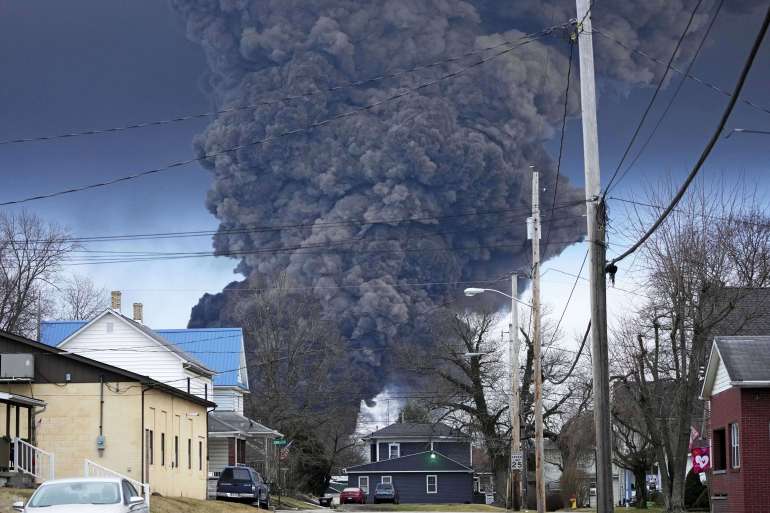EPA chief promises results after Ohio train crash

His visit came as the Biden administration is facing pressure from state leaders and federal lawmakers of both parties to require Norfolk Southern to clean up its toxic pollution.
Regan said EPA was conducting indoor testing and had so far cleared 480 homes as free of vinyl chloride and hydrogen chloride, two of the most dangerous of the chemicals that were transported by the train. He also noted EPA has been conducting round-the-clock air monitoring from ground sources and via the agency’s sniffer plane.
State and local agencies are also conducting tests of public drinking water supplies. Ohio EPA Director Anne Vogel said tests of municipal wells showed no signs of contaminants, though owners of private wells should have them tested before drinking from them. Bottled water is available in the interim.
Regan said at the news conference that Norfolk Southern will pay for the response.
“We are absolutely going to hold Norfolk Southern accountable and I can promise you that,” he said.
Norfolk Southern President and CEO Alan Shaw wrote in an open letter to the town on Thursday that the railroad “will stay here for as long as it takes to ensure your safety and to help East Palestine recover and thrive.” However, he angered residents by declining to attend a Wednesday night town hall on the disaster.
EPA formally informed Norfolk Southern last week that it is potentially liable to pay for all clean-up costs related to the derailment. The company has said it “is willing to perform or finance the response activities related to the incident.”
Regan’s visit prompted bipartisan comity among lawmakers who represent the area.
“Administrator Regan, I want to thank you for coming in today. It means a lot to these folks here,” said Rep. Bill Johnson (R-Ohio).
However, the incident has also stirred up bipartisan complaints, both about the Biden administration’s immediate response and longer-term issues with regulatory oversight over the shipment of hazardous materials.
“While I am glad EPA Administrator Regan will visit the site today, it is unacceptable that it took nearly two weeks for a senior administration official to show up,” Sen. Joe Manchin (D-W.Va.) said in a statement. He called on the administration “to provide a complete picture of the damage and a comprehensive plan to ensure the community is supported in the weeks, months and years to come, and this sort of accident never happens again.”
Sens. J.D. Vance (R-Ohio) and Marco Rubio (R-Fla.) in a Wednesday letter to Transportation Secretary Pete Buttigieg questioned federal oversight of the railroad industry. “It is not unreasonable to ask whether a crew of two rail workers, plus one trainee, is able to effectively monitor 150 cars,” they wrote.
Rubio has gone even further in his criticisms of Buttigieg.
“I don’t know what @SecretaryPete needs to do to get fired,” he tweeted on Thursday.
Sen. Sherrod Brown (D-Ohio) said on Thursday that he’s investigating whether trains carrying hazardous materials are required to be labeled, which could help responders better understand and react to tankers’ contents.
“But we think we might need a change in federal law and Bill [Johnson] and I will work on that,” Brown said.
Tension in the village has been building since the train crashed, especially after officials decided to burn off the remaining vinyl chloride at the site to prevent an explosion.
Hundreds of residents attended Wednesday’s town hall, but Norfolk Southern representatives declined to attend because of alleged threats against its employees.
“We have become increasingly concerned about the growing physical threat to our employees and members of the community around this event stemming from the increasing likelihood of the participation of outside parties,” the company said in a statement ahead of the meeting.
Vinyl chloride is a clear gas used to make polyvinyl chloride, a common form of plastic. Acute exposure can lead to nervous system effects like dizziness and headaches. Chronic exposure can lead to liver problems, including a rare form of cancer called angiosarcoma.
The train was carrying a variety of substances in addition to five tankers of vinyl chloride, according to a manifest dated Feb. 12 released by EPA. Other derailed cars included hazardous materials such as butyl acrylate, ethylene glycol and monobutyl ether. Also on the train in cars that do not appear to have derailed were solid plastics products such as polyethylene and polypropylene, several tankers full of petroleum lube oil, and nine box cars full of malt liquors.